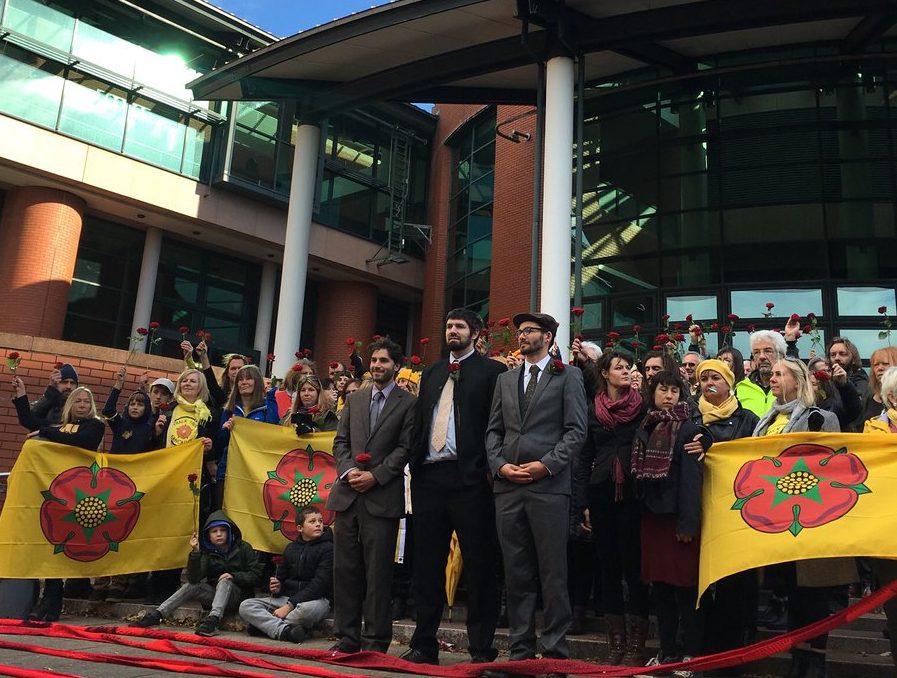Three men who were jailed for their part in a non-violent fracking protest have had their prison sentences overturned and described as ‘manifestly excessive’ by the Court of Appeal.
In late September, Simon Roscoe Blevins, a soil scientist, and Richard Roberts, a teacher, were both sentenced to 16 months in prison. Richard Loizou, a piano restorer, was handed a 15 month sentence. The three men were jailed after being convicted of causing a public nuisance by a jury at Preston Crown Court.
The prison sentences, believed to be the first time non-violent environmental protesters had been jailed since 1932, raised fears of a crackdown on protests and civil liberties.
The Lord Chief Justice, Lord Burnett of Maldon, said: “We have concluded that an immediate custodial sentence in the case of these defendants was manifestly excessive.
The Right to Peaceful Protest
It’s critical we stand up against the criminalisation of peaceful protest, against fracking & against climate breakdown #FreeTheThree #solidariry pic.twitter.com/8ebXqaldrR
— Caroline Lucas (@CarolineLucas) October 17, 2018
They climbed aboard the cabins of the lorries and camped there for periods ranging from 45 hours to 84 hours, causing disruption to traffic.
A fourth defendant, Julian Brock, 47, was given a 12 month suspended sentence after pleading guilty to the same offence.
The right to protest falls under Article 11 of the Human Rights Convention, the right to free association, which protects the right of a group to take collective action and the right to freedom of assembly. It also protects the individual right or ability of people to come together and collectively express, promote, pursue, and defend their collective or shared ideas
However, Article 11 is a ‘qualified right’, which means it can lawfully be interfered with in the interest of public safety, the prevention of disorder or crime, or the protection of other people’s rights and freedoms.
The Human Rights Act 1998 marked the first time in English law that the right to protest was explicitly protected.
The right to protest also involves Article 10 of the Human Rights Convention, which protects the right to free expression and means we can have our own opinions and share them with others, including publicly and as part of a group.
It states: “Everyone has the right to freedom of expression. This right shall include freedom to hold opinions, and to receive and impart information without interference by public authority and regardless of frontier.”
After the three men were jailed, civil liberty groups including Liberty, campaigners and MPs, expressed concern that the right to protest and freedom of speech – both cornerstones of democracy – were under threat.
The right to protest is a fundamental human right.
Liberty
Following the Court of Appeal’s decision, Liberty’s Emma Norton said: This is a fantastic decision from the Court of Appeal. The sentences were manifestly excessive. Those men should never have been in prison. The right to protest is a fundamental human right.”
‘We Don’t Lock up Protesters Who are Peaceful’
Richard Loizou reads a statement after he and two others are released from Preston prison after the high court quashes their sentences #fracking pic.twitter.com/pl207AQglw
— Frances Perraudin (@fperraudin) October 17, 2018
Following the Court of Appeal’s decision, Richard Robert’s partner Michelle Easton told the BBC, “It is still a conviction but it is within the rights that we have in this country – we don’t lock up protesters who are peaceful.”
Upon his release, Richard Loizou read from a prepared statement which argued: “When people peacefully break the law out of a moral obligation to prevent the expansion of fossil fuel industries, they should not be sent to prison.
“The fracking industry threatens to industrialise our beautiful countryside. It will force famine, flooding and many other disasters on the world’s most vulnerable communities by exacerbating climate change.
“Fracking is beginning right now, so there has never been a more critical time to take action. Your planet needs you.”
This week fracking for shale gas in the UK resumed for the first time since 2011 at the Preston New Road site in Lancashire.
A protest against fracking at the Preston New Road site is planned for Saturday.
I welcome the decision to quash the unjust sentences of fracking protestors.
We stand in solidarity with the activists and thank them for standing up to the further destruction of our environment by this Tory Government.
When Labour gets into government we will ban fracking.
— Jeremy Corbyn (@jeremycorbyn) October 17, 2018
Featured image credit: Frack Free Protest







